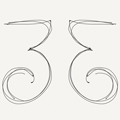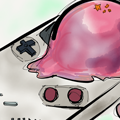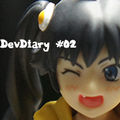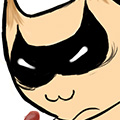Writing has always been something I really liked doing. Handwriting not as much, because I could never do beautiful curves. However, doing this writing project in the most analogue way has taught me three things mainly:
a) it is important to think slowly (and that is why I still take notes the old way);
b) ambidexterity is an illusion (at least for me);
c) I can produce stories (meaning, I can in fact write).
Writing with my non-dominant had – what a silly idea!, one could think. There are studies about using the non-dominant hand for daily tasks, and the issue of ambidexterity is controversial (see this, this and this). I never ceased to be curious about it, though, and recently I have been bothered by the fact that my right hand does everything. I started feeling too dependent on just one hand, and soon enough I realized that some things on the right side of my body were different from the left one. My posture, for example, is inclined to the right, due to the fact that I carry purses, backpacks and folders only using that side. Then I thought with myself: “that won’t do”, and started exercising my left hand to wash the dishes or brush my teeth. It didn’t take long until I started scribbling with it – then I had the idea for a project I could maintain for a month, more or less, and share it so other people could see my work. I had been looking for the right moment to start a writing project to develop my skill of writing on demand, and this training sounded like to perfect opportunity.
The number 33, however, is almost arbitrary.
It was difficult at first. My left hand would involuntarily fidget sometimes and I had to breath and calm down to finish writing the story. This led me to taking it slow: I’d take my time thinking about the story and the characters, on how I could develop the plot in that restricted amount of lines. As I said before, this was really beneficial, because it helped me to control my impulses on writing simply what came to mind. I could notice how stories, or any account in general, could be changed on the fly, without previous notice, to fulfill certain requirements (in my case, the number of lines). I also realized that the more lines I had, the more comfortable I felt; but the fewer lines I had, the more creative I was compelled to be.
I think writing practice for stories in small portions is consistently productive for game writers. Not that I don’t like verbose games. I do like them, actually (and my scripts are so far wordy), but being under a kind of narrow-space, not-many-options pressure helps you use words and constructions more effectively, avoiding garrulousness and padding out. You go straight to the point you want to express in your narrative, and you have more control to leave blanks for player interpretation when desired.
When I was taking a discipline in college about narrative theory, the professor used to say that writers have absolute control over each and every word during the writing process, and that skill is something that requires practice. Of course, it is easy to practice with a smaller text than with a long one. Therefore, although the small stories didn’t give me much room for development, they indeed helped me to think about the efficiency of conveying a story with just few words. Basically, when confronted with only one line or two lines to convey a narrative, and having known that other people already tried this, what I asked myself was: why not?
In the middle of this project I also realized I had more ideas than I could put into practice. I had to make a choice of character and settings I’d like to use. Many of those are still in my idea plan, but some of them I managed to conclude. That is the reason behind a “girl’s week” and a “boy’s week”, in which I feature only girls or boys as the protagonists. It was, more than anything, fun. Writing on the behalf of other, unreal beings spawned a some main characters that I’d like to see on a game (Tracy McMillan, for example).
I also took the opportunity to make use of the last two entries to write support stories for both of our upcoming games. The stories are diary entries by our two protagonists, Enid and Aoi. I can say that they give background to what is going to be played, and I’m planning to feature both texts in-game as well, in a reviewed and expanded version.
I am not thinking of another writing project to publish here. I am thinking of leaving this one to “cook” for a little while – in the future I will certainly go back to it. I am thinking of using one of these stories (or many) on a game, expanding then in a sort of short story, working with another illustrator to make the drawings, this sort of stuff.
On a final note, remember that I am always open to criticism. Bash away!
Thank you for keeping with the project. Hope you enjoyed and I hope you enjoy the next ones even more!
(☆^ー^☆)

 33 Left Hand Stories in 33 Days
33 Left Hand Stories in 33 Days 100 Days of /r/SketchDaily
100 Days of /r/SketchDaily SuperSugoiSoftStudios DevDiary #02: Building the Storyline
SuperSugoiSoftStudios DevDiary #02: Building the Storyline The development of a blog
The development of a blog Dec 29th, Aoi’s diary single page
Dec 29th, Aoi’s diary single page